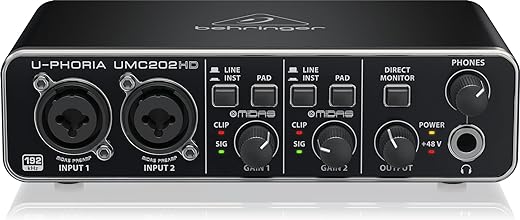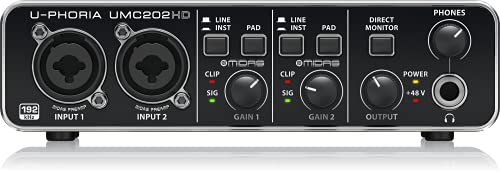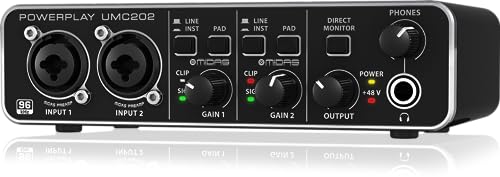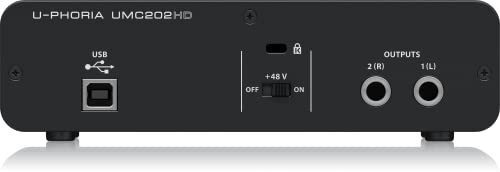Introduction
The Behringer U-PHORIA UMC202HD is a small device made for people who love recording sounds or music. It gives really good sound quality like the pros but doesn’t cost a lot. It has lots of cool stuff to make your recording experience better.
Design and Build Quality
- Compact and sturdy build ideal for portability.
- Simple layout with accessible controls for easy operation.
- Two combo XLR/TRS inputs for versatile connectivity.
Performance
- Crystal-clear audio quality with 24-bit/192kHz resolution.
- MIDAS-designed mic preamps ensure studio-grade sound reproduction.
- Zero-latency monitoring for real-time audio without delays.
Connectivity and Compatibility
- Versatile connectivity options for microphones, instruments, and line-level devices.
- Compatible with various recording software on both Mac and PC platforms.
- Powered via USB, eliminating the need for an external power source.
Pros
- Exceptional audio quality with high-resolution recording capabilities.
- Durable and portable design suitable for recording on the go.
- Versatile connectivity options cater to different recording needs.
- Compatible with various recording software for user convenience.
Cons
- Some users might find the provided cables to be of average quality.
- Limited to two input channels, which may not be sufficient for larger recording setups.
Conclusion
The Behringer U-PHORIA UMC202HD is a budget-friendly and full-featured device that helps connect different audio tools. It’s great for both newbies and pros. With really good sound, lots of ways to connect, and a small size, it’s a useful gadget for anyone making recordings.





Ltd.co –
Prior to deciding to buy the Behringer U-Phoria, we had been struggling with the Steinberg UR22 for a few years now . With the UR22, you needed to install over 10GB of software and drivers, and the jump through hoops to get your account which is only allowed to run on a single machine, and is a lot of hassle to set up. Nothing so hard with the Behringer U-Phoria; we simply plugged it in to our PC, no software nor drivers required, the power LED lit up and we plugged our mic and headphones in – and it just works flawlessly. And better yet the sound quality from the U-Phoria is even better than the UR22. I can thoroughly recommend the Behringer U-Phoria. It’s cheap, and very straight forward to use, with great sound quality. Sincerely get this product – it has made our lives so much easier and is my new favourite interface!
Neil S. –
The item itself works as it should, the recordings through both my chromebook and android phone work well and it provides a good sound via the mic and attached electric guitar.
I actually bought it to use with an acoustic, but the sound with either the built in pickup or an external one is extremely low. However, from what I’ve been able to research this is common, and is probably not the fault of this unit. Although the acoustic does work just fine when connected directly to my amp?
Looks like an additional unit is required to sit between the acoustic guitar and this to boost the sound output. So I’m going to try that. If anyone else is looking to use this for the same purpose, would be worth noting.
Hector Palacios –
De las mejores interfaces de audio por calidad y precio
Martin C. –
I’ve been recording music and sound both professionally and for fun since the mid-90’s. I’ve been fortunate enough to get to use a wide variety of equipment at all levels, from cheap junk to top pro quality. My home desktop recording setup has centered around an M-Audio Delta1010 card for many years. In studios, I’ve used a variety of things, from Digidesign, RMC, Apogee, etc… I needed a simple and cheap USB interface to use with an old beater laptop for some mobile recording. After much research, I nabbed a Behringer UMC404HD. The price was cheap enough to be worth the gamble; I’ve used Behringer things a few times in the past, but never an interface, and was worried it might be too junky to be usable. But seeing that these are perpetually out of stock at most places, I figured it would be easy enough to flip if it ended up being a lemon. Thankfully, I won’t even need to worry about that, because this one is a winner! Best $99 I’ve spent on anything in a long time.
Sound quality is great. I’d say the quality of the conversion beats my M-Audio card (which was originally at least 6x the price!). I’m going to chalk this up to improvements in technology over the years, and it really makes the Delta show its age. A nice clear sound, not lacking in body, and doesn’t have any of the harshness I’ve encountered with other Behringer products of the past. I’m not going to say it’s “warm” sounding at all, but it really doesn’t need to be, honestly. It’s just a solid clear sound with a minimum of any noticeable hype or color. Behringer’s parent company recently bought Midas, and the UMC404 claims to have the same mic preamps as used in the high end Midas consoles. Which model of console is anyone’s guess, and it’s really more just an excuse to stick the name on there to play off the reputation of the name (though, Midas is a big name in live FOH consoles, not really anything to do with recording consoles). But whatever, the mic preamps do sound good. Noise isn’t too bad – recording piano with some dynamic mics didn’t get any bad noise issues. It will get a bit hissy if you have to max the gain out, but there are few situations where I see that happening, and if you really need lowest noise, you can always use a nicer external preamp and patch into the line inputs. The inserts included on each input is a nice touch! You can easily patch a compressor after the mic input – which is good news for tracking vocals. This is an extremely helpful feature that most other interfaces neglect.
One complaint about the mic preamps: they don’t work well with low-output ribbon mics. I tried it with my Cascade Fat Head II and it was a no-go. Not enough clean gain available. Had to max it out to get any signal and at that point the noise was too much. Ribbon users would need something like a Cloud Lifter or other external preamp to be able to use them with the UMC. Too bad, but that’s really not a huge letdown considering the price and how well the unit performs otherwise.
Control panel for the drivers is very spartan, but it does enough to tell you what’s going on and make a few adjustments. People like me who are used to the luxury of an onboard DSP zero latency monitor mixer (like the Delta has) will be a little disappointed by the lack of monitor adjustment with the simple analog input monitoring on the box itself, but it’s still work-able, just a bit unusual to lack a separate control for monitor mixing. But considering the price and general sound quality, this isn’t really a complaint.
As far as how well it plays with software, I’ve tried this with Adobe Audition, Reaper, and Tracktion. It works just fine doing multitrack using the ASIO drivers in Reaper and Tracktion, but it did NOT work well with Audition at all. Attempting to use the ASIO drivers to do a multitrack recording in Audition caused Audition to crash. Multitracking in Audition doesn’t seem to work at all with this, even when switching to the MME or WASAPI drivers. I’m blaming this on Audition because Adobe sucks. Tracktion was billed as “included” software, but it wasn’t actually in the box with it, and when I registered the product with Behringer to get my “free” download code, I have yet to get any reply from them. There’s a free version of Tracktion available and that’s probably what they’re talking about. Behringer pulled this crap before by including the freeware Audacity with interfaces and billing it as some great deal of included software (and Audacity sucks, BTW). Tried messing with Tracktion a bit, but really not a fan of the workflow. It’s quick and easy, but it’s too stripped and just not an interface I find comfortable. Reaper gave the best results for multitracking on the laptop, and then I used Audition for editing/mastering the final mix. My main software on desktop is Samplitude Pro X, but I haven’t plugged the Behringer into my desktop yet. The laptop is running Win10, so good news for Win10 users that the drivers seem to work fine with it.
Haven’t tested the MIDI yet, and therefore haven’t used any realtime softsynths with it, so I can’t make any judgment about the latency. The control panel gives you some control over this, so I’m sure I could probably get it to where it feels good for realtime synth. But as this is being used almost exclusively for recording, low latency is really not on my list of needs.
Time will tell about the long-term reliability of a $99 interface with this much packed into it, but overall construction seems solid and I’ve had no feelings about it being too delicate to carry around in my backpack. Should hold up well to regular mobile use.
Giving something like this 5 stars seems excessive, because there’s certainly better out there. But at this price? Not even close! In the very crowded world of sub-$200 audio interfaces, I will put the UMC404HD up there as a clear winner.
CSamuelCG –
Es de muy buena utilidad y me sirve para casi todo
Jair Cera –
llego en perfectas condiciones y funciona bien
Matthew Brooks –
What drivers? I didn’t need a driver once. Of course, I’ve updated my installation of Windows (10) correctly. I suggest you do the same before continuing. A lot of people DL or buy Win10 thinking it’s ready to use, but no. It actually requires updating straight away, and unless you do that by downloading the offline installer (Google it) and spending 90+ minutes actually updating the computer, you’ll be in for a heck of a time with Win10 compatibility all across the board. As far as the Behringer is concerned, with an updated version of Windows (10), it worked immediately and simply. I couldn’t tell you what would happen if it weren’t updated, but I imagine it’d be harder.
I’ve found that the system needs the 48V boost to be on in order to work (for me, that is; I’m pairing it with an MXL 770, which is itself exemplary.) The gain knob is terrific, the dial is actually smooth. Almost feels like the dial on a guitar amp. This feels like a unit that was constructed using every bit of its price tag. It’s plastic, but that’s fine. The unit has weight and sophistication. I don’t understand why there is a single bad review… scratch that, it’s human error. That or poorly maintained OS updating/operation. Get your Windows working and you’ll be fine.
I haven’t played with the secondary input, or even the onboard earphone out jack. Haven’t needed to. The unit makes no hum or noise. All I hear is my voice, my mouth smacking and the CPU/case fans I have yet to reconcile in my setup. Completely satisfied. I’ll update this if the unit ever fails. So far, so good. P.S. I’m using my own USB cable, which is gold plated. Perhaps that’s adding to the experience, perhaps it’s placebo. In either case, the cable the unit comes with is amply long and looks pretty solid. Not even thin, like what HP gives you with their printers. It’s a standard USB… no micro, no mini, no bloody “C”. It’s an original USB that has the big square shape with the tapered side that looks as big as an old Apple Firewire. Don’t know how or where a boost of forty-eight volts is coming from or even possible. The unit has no supplemental power. Hopefully it isn’t frying my MoBo or USB port.
It just seems to WORK! and I like that a lot. Glad I didn’t spend more money on the Focusrite, although there may be a benefit there. For the purpose implied, this Behringer U-Phoria UM2 is perfect and the price is more than right. Go ahead and buy it, and ignore these negative plebeians, unless they have a professional reason for not liking the unit. I maintain that it’s due to improper setup. Didn’t notice any interference, and I’m also using a USB Logitech headset, the kind they use for phone calls at call centers. If a Logitech unit’s drivers are getting along with another USB audio device, then you know you’re going to be fine.
Personally, I love this thing and can’t speak highly enough about it… knock on wood!